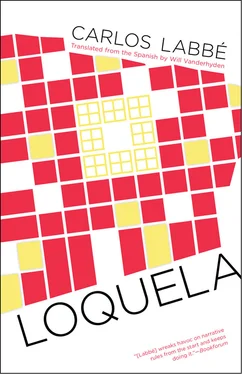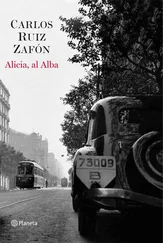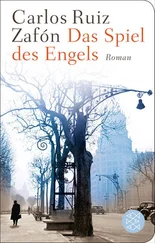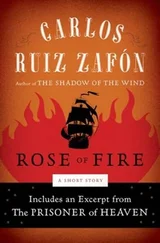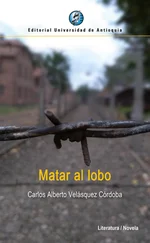Someone would be coming by to pick up the suitcase, Carlos said. Elisa held him tighter, resting her head against his chest. Without listening to him she murmured that it felt like winter, a rainy winter. Carlos ran his fingers through her hair and asked who’d be coming by to pick up the suitcase. She continued, saying that it was like they’d cut off the electricity to all of Santiago and it was only going to come back on after a downpour of many days; only the rubble would be illuminated, wet under the light of a sun that would come out at last. Carlos kissed her. She added that there was no way she was going to answer the phone if it rang again, and he noticed that, in the half-light of the living room, the streetlamp caused a luminous line to come in through a crack between the curtains, falling transversally across the two of them, across the sofa, the glass of the table, and the chair where the suitcase rested. The light divided the living room in half, that space where the two of them took refuge, Elisa said. They continued holding each other in silence, then she began to fantasize that she was interrogating him: she put her chin on her boyfriend’s abdomen, face down, so that the questions she asked tickled him and he was unable to answer. Where had her female friends gone, they didn’t call her anymore. Why was she so afraid recently, even when they were holding each other; surely she was watching too many movies, reading many books, paying excessive attention to news about wars, assaults, domestic violence, and accidents. When she was asleep she’d wake up because the disc she’d been listening to ended, and at an hour when there wasn’t even the sound of cars in the street. She started to tremble. Carlos twisted the hair on the nape of her neck around his fingers and told her to be quiet, sshh, but she asked again why it was so cold if it was summer, and what. . where did that bell they heard on Sunday mornings come from, if the one time she woke up, got dressed, and went to the church to see, of course, it’d been locked. All the while, he couldn’t stop thinking about what he’d done the previous afternoon: he decided to get rid of the notebook containing the detective novel. He’d reviewed the whole thing in a couple of hours, and he was so annoyed by the silence in which he was reading that he ended up saying the dialogues between the protagonist and the other characters out loud, almost shouting; people passing by in the street looked in the window. Sweating, he’d let himself collapse on top of the desk when he realized that there was nothing at all intriguing about a guy who plotted a murder — of the albino girl and of the reader — behind the protagonist’s back, it was nothing more than the account of a storyteller obsessed with loneliness, in which there was no room for any characters besides himself. The tale of a suicide that was never named, that’s what he’d written; so where did the gunshot and the twisted face in the mirror go? Now he heard Elisa asking why, while napping, she’d had that nightmare: she was a man stranded on a faraway island, she spent innumerable days building a hut and, after she placed the final branch, she went inside to rest; but the structure collapsed and her body was trapped. No, Carlos decided, I’m not going to keep writing the diary of a madman. The first thing to do was tear out the pages of the final chapter; from there he would make a new novel, one in which a man, after an inexplicable tragedy, would find a wife, a family, and a place in the city. He went down to the corner store. This time he picked out a spiral notebook, with three sections and a plastic cover, totally different from the one with sixty yellow pages that he’d found forgotten in his sister’s drawer, adorned with only a couple childish drawings on the back cover. Elisa had spoken to him once about a box where she kept things she didn’t want to see again but didn’t dare throw away. They’d argued about that, and he got the impression that the poems and stories he’d given her in high school were in there, he swore to her that he’d never regret anything he’d written. Okay then, this was the moment to decide, to hide away the voice of that protagonist somewhere that would drown out his cries. Back in the store he found an elegant box that, according to the saleswoman, had once been used to store top hats. He threw the notebook inside, went on foot to the bridge at Pio Nono and Santa María. When he lit the box on fire, the wind unexpectedly ripped it from his hands and hurled it into the Rio Mapocho, for a long time he stayed there, watching how the current carried away the soaked remnants. The stench of the riverbank was nauseating: this was revulsion now, not fear, and he felt relieved. From a payphone he called Elisa and awkwardly told her that he’d burned the story of the albino girl. Elisa interrupted him: coincidently, her clothes smelled like smoke; she’d spent the afternoon talking with Violeta, while the bakery across the street from her house burned. He was silent. The truth, she went on, was that she hadn’t told her anything about the letter she’d kept hidden for months now. She couldn’t take it anymore, she was going to take it to her now, she would return it and he could do whatever he wanted with the albino girl and her messages. Now Carlos stared into darkness of the living room and kept touching Elisa’s soft neck, entranced by the line of light that was falling across the rug as her voice grew almost inaudible, asking why everything creaked in this house, when were they going to bed, why was she so alone if she wasn’t alone. The next day he would personally return Violeta’s letter; moreover, he decided, he wasn’t going to open the envelope. For him it was enough that he was there, holding Elisa, the two of them sleeping together on the sofa. He was also confident that it was too late now for anyone to come pick up the suitcase, that the next morning the two of them would wake up with the sun on their faces and they’d still be in the same position.
CORPORALIZATION MANIFESTO
(Unprintable text)
I’ll only be satisfied when I sit down to write: I’ll find people who share my ideas or whom I’ll convince to agree with me. Then I’ll try to form a group with them, stating at the outset that the results will depend exclusively on the plurality of the project.
The reader lives and the author has died, we’ll proclaim, though our goal will be to resuscitate him, to give him what he never had: body, flesh, presence. And what will die instead is the text, the artistic product that escapes from our hands and becomes merchandise: all the time we spent spilling our blood across the page is transformed into food for publishers, newspapers, critics. That’s why we’re anemic, that’s why we need to suck up the humors of others and end up dissolved in foreign books, that’s why we die every time we read, in handwriting that is not our own, a sentence that belongs to us.
We ourselves will be the project, our own breathing will be that of every character we create. The autonomous world of the text will no longer be able to justify this or that coward, because it won’t exist anywhere but in each moment of our existence. Every time that a respectable voice pejoratively describes the initial action of one of our chapters, for example, it will be passing judgment on our way of life, which naturally will provoke a reaction. Literature is a fight to the death but, since we are the creators and all the others just have fun at our expense, the balance is leaning in our favor from the beginning. As the virtuosos of the world join Corporalism, the indolent will wonder desperately what inexplicable phenomenon has caused the people to cease, suddenly and en masse, producing works of art. And we’ll respond with the joyful silence of those who share a secret.
Читать дальше
